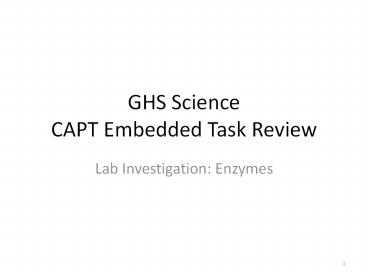GHS Science CAPT Embedded Task Review PowerPoint PPT Presentation
1 / 15
Title: GHS Science CAPT Embedded Task Review
1
GHS ScienceCAPT Embedded Task Review
- Lab Investigation Enzymes
2
Your Task
- A CT apple juice company needs your help to
determine how enzymes can be used to produce
apple juice from apple sauce. - They provide you with two enzymes to see which
enzyme will make the most juice. - Enzymes
- Pectinase
- Cellulase
3
What are Enzymes?
- Enzymes are proteins found in the cells of all
living things. - Enzymes connect to molecules in living things to
break them apart or put them together. - A substrate is the original molecule that
connects to the enzyme.
- This picture shows an enzyme binding to a
substrate.
4
Lab Design
Most GHS students used a procedure that looked
something like this
- 1. Place filter paper in a funnel and put funnel
in a flask.
Funnel with filter paper in it
Flask
5
Lab Design
- 2. Set up three flasks with funnels.
A B
C
6
Lab Design
- 3. Pour exactly 20 g of apple sauce into each
funnel.
A B
C
7
Lab Design
- 4. Add a different enzyme to each funnel.
A B
C
8
Lab Design
- 5. Let each flask sit for exactly 10 minutes.
A B
C
9
Lab Design
- 6. After 10 minutes, measure how much juice was
produced from each flask using a graduated
cylinder.
Graduated Cylinder
Apple Juice Produced
Apple Juice Produced
Apple Juice Produced
A B
C
10
Sample Data
Enzyme(s) Enzyme(s) Enzyme(s) Enzyme(s)
Flask A Pectinase Flask B Cellulase Flask C No Enzyme Added
Amount of Juice Produced 3.0 ml 5.0 ml 0.5 ml
11
Analysis Questions
- Directions On a separate sheet of paper,
answer the following questions in complete
sentences. - Identify the following for this experiment
- Problem statement
- Independent variable
- Dependent variable
12
Definitions
- Problem Statement The problem that the
scientist is trying to solve. - Hypothesis An educated guess that answers the
problem statement. Often, an If Then
statement is used. So, If I change the
independent variable, Then the dependent variable
will change in this way. - Independent Variable The variable in an
experiment that the scientist purposefully
changes. This change should affect the dependent
variable. - Dependent Variable The variable in an experiment
that changes and that the scientist measures.
This variable depends on the independent
variable. - Control The baseline that you can compare the
other groups exposed to the independent variable
against. Used test how valid the independent
variable is. - Controlled Experiment An experiment in which all
factors are kept constant except for the
independent variable.
13
Analysis Questions
- Identify two variables that were held constant in
this experiment. - Explain why it is important to hold these
variables constant. - What was the substrate and the product(s) in
this experiment? - Why was it important that flask C was used?
- Based on the data, what would your conclusion be
for this experiment?
14
What are Enzymes?
- Enzymes are proteins found in the cells of all
living things. - Enzymes connect to molecules in living things to
break them apart or put them together. - A substrate is the original molecule that
connects to the enzyme.
- This picture shows an enzyme binding to a
substrate.
15
Going Further Challenge Questions, Set 1
- After performing this experiment, you learn from
the apple juice company that Pectinase and
Cellulase cost different amounts - Pectinase .50 per ml
- Cellulase 1.00 per ml
- The apple juice company wants you to be as
cost-effective as possible in producing the most
amount of juice. - Explain to the company which enzyme is most
cost-effective (ml/)?
16
Going Further Challenge Questions, Set 2
- A group of students are convinced that pectinase
is the most cost-effective enzyme to choose to
produce apple juice for the company. They think
that temperature may affect how much juice
pectinase can produce. - In a new experiment, they test their hypothesis.
Using the same basic design as the original
experiment, the students heat apple sauce with
pectinase to different temperatures to see which
temperature is optimal for producing the most
apple juice. - The temperatures are 0C, 20C, 40C, 60C, 80C
17
Going Further Challenge Questions, Set 2
- The results of the students new experiment are
shown below
Amount of Apple Juice Produced
5 ml 10 ml
0 20 40 60
80 Degrees Celcius
18
Going Further Challenge Questions, Set 2
- Explain the behavior of pectinase in temperature
range 0-20 C. - Explain the behavior of pectinase in temperature
range 50-80 C. - What would be an appropriate conclusion for the
new experiment?

